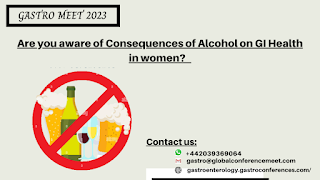Are you aware of Consequences of Alcohol on GI Health in women?
When compared to men, women are recognized to be at an increased risk from alcohol consumption. According to many research, when men and women consume the same amount of alcohol, women after drinking have greater blood alcohol concentrations and are more weakened than males. Women are more prone than men to organ damage and other injuries after drinking. Additionally, it has been seen that women who drink more frequently die at higher rates than men due to situations like suicide, car accidents, and other health issues. It's possible that gender differences, such as those in brain chemistry or metabolism, are to blame for the higher hazards of drinking. Women have a different metabolism and absorption than men.
Risks Associated with Alcohol on GI Health:
- Salivary gland atrophic alterations are becoming more pronounced as a result of alcohol consumption.
- Reflux esophagitis: When you drink alcohol, the valve between your esophagus and stomach relaxes, causing your esophagus to burn. Food and beverages in little amounts might cause acute pain beneath the breast bone.
- Alcoholic Gastritis causes the tongue to swell, the victim's face to turn pale, and their heartbeat to speed. Uncontrollable vomiting and nauseous symptoms can occur. Your mouth still tastes like bile after you've vomited. You should quit drinking alcohol as soon as the first alcoholic gastritis attack occurs.
- Disorders of the liver: Alcoholism causes the enzyme systems in the liver that break down alcohol to function less efficiently. Mucous membrane irritation and a rise in women's drinking frequency are both seen. The parenchymal tissue of the liver degrades quickly. Cirrhosis and acute alcoholic hepatitis are common. Sometimes, this can even result in death. Additionally, there is a higher chance that biliary dyskinesia will develop. Rocks are created through the use of sweet wines and liqueurs.
- Alcohol usage in women can have negative effects on the pancreas, including the onset of type 1 diabetes and acute or chronic pancreatitis. Occasionally, surgical intervention is necessary.
Recovery:
Every woman should be aware that drinking is not just a support system. You can ask others for help with your medical or emotional needs. A person can decrease or quit alcohol consumption with the aid of various medications, treatment programs, and psychotherapy. It all comes down to your health. You can do a lot if you're in good health. Never let alcohol impact your mind or body, and keep it far away from you. You will only benefit from your willingness and drive to stop drinking. Consult a gastroenterologist right away if you experience any pathological issues with your GI system after consuming alcohol.
.png)
.png)
.png)

Comments
Post a Comment